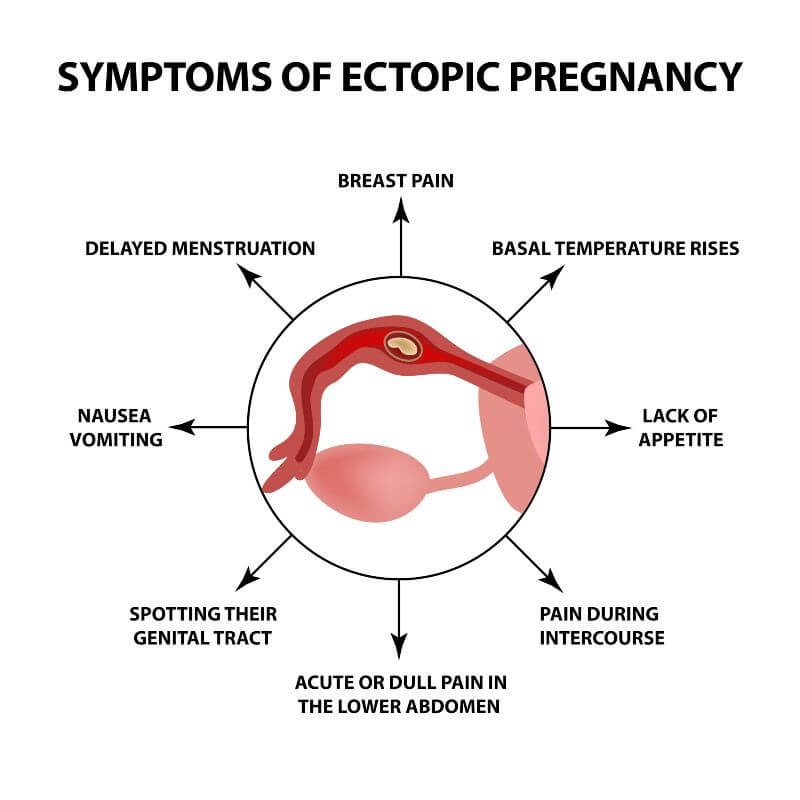An Ectopic pregnancy is a traumatic experience for women. Usually within days or weeks from the happy news that she is becoming a mother she hears that she is losing her baby. An ectopic pregnancy if not diagnosed on time, can cause severe complications.
What is Ectopic pregnancy ?
In some cases, the fertilized egg cannot reach the uterus and implantation takes place on the ovary, in the abdominal cavity, cervix or the fallopian tube. An ectopic pregnancy is basically a pregnancy outside of the uterus. An ectopic pregnancy requires immediate intervention to prevent complications and life-threatening situations. Ectopic pregnancies unfortunately always need to end.
Ectopic Pregnancy symptoms

Signs of ectopic pregnancy at first are the same as any normal pregnancy and show an interruption in the menstrual cycle accompanied by symptoms like nausea, breast pain, fatigue and lower back pain.
Symptoms of Ectopic pregnancy usually develop around the sixth week of pregnancy and can be vague at the beginning you might not even know you are pregnant yet! Bedaya Hospital always advices you to take a pregnancy test if your menses is late!
Symptoms of an ectopic pregnancy are in the beginning often vague and mild and can be interpreted as the onset of menstruation or if you know you are pregnant early symptoms of pregnancy. Always keep the option of an ectopic pregnancy in mind if you experience any of the following symptoms.
1- Mild vaginal bleeding; could be a warning sign of ectopic pregnancy.
2. Pain in the lower abdomen: This pain could vary from a consistent dull nagging pain to a sudden sharp pain depending on the location of the ectopic pregnancy.
3. Nausea and vomiting
4. Feeling lightheaded and tired
5. Unilateral pain which means pain in one side of the body
6. Pain in rectum, shoulder or neck
7. Internal bleeding; This is when the situation becomes critical severe pain, nausea, dizziness, short shallow breathing and an elevated heart rate are all symptoms of an ectopic pregnancy that ruptured a fallopian tube or did damage to other organs.
You can’t prevent an ectopic pregnancy but you can take some precautions to reduce your chances to get one by always treating any vaginal inflammation or infection, treating STDs and quit smoking.
Ectopic Pregnancy causes
Possible causes of Ectopic Pregnancy include:
- Inflammation or swelling of the fallopian tube can lead to partial or total blockage, preventing the fertilized egg from passing through.
- Scar tissue. It may be difficult for the egg to move through the fallopian tube if its path is blocked due to the presence of a scar tissue formed following inflammation or surgical manipulation.
- The shape of the fallopian tube. Sometimes it may be difficult for the fertilized egg to move through the fallopian tube if the shape of the canal is abnormal as a result of abnormal growth or birth defects.
Ectopic Pregnancy treatment
Treatment of Ectopic pregnancy involves termination of pregnancy through medication or surgery.
If the pregnancy is diagnosed and the symptoms of ectopic pregnancy have not progressed into causing internal bleeding or organ damage an injection of methotrexate is given as treatment of the ectopic pregnancy. Methotrexate stops cell division and so terminates pregnancy. If methotrexate is given you will have to repeat a pregnancy test every 4 days to make sure the pregnancy hormone levels are decreasing until they reach zero.
If the ectopic pregnancy has progressed into causing internal bleeding or organ damage a laparoscopic approach could be considered to remove the ectopic pregnancy and the fallopian tube it is usually located in. If it is located elsewhere or the bleeding is severe an open surgery is considered. Open ectopic pregnancy surgery could be a lifesaving intervention.
Can an Ectopic pregnancy be saved?
Ectopic pregnancies, which consist of about 2% of all pregnancies are caused by hindered egg migration through the fallopian tube.
If you suspect an ectopic pregnancy visit your doctor right away or go to the ER, they will access your situation and handle accordingly. If your ectopic pregnancy can conservatively be treated the fallopian tube usually remains intact. If you require surgery, it is likely they remove the pregnancy and the tube it nestled in. and you might need help becoming pregnant in the future if the other fallopian tube is impaired too.
Unfortunately, an ectopic pregnancy can not be saved or transferred into the uterus
Can an ectopic pregnancy move to the uterus on its own?
An Ectopic pregnancy cannot move to the uterus because it has implanted elsewhere and started forming blood vessel connections with its surrounding tissues.






